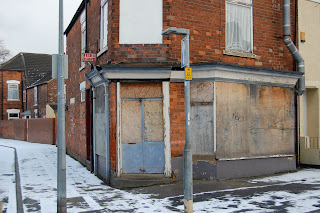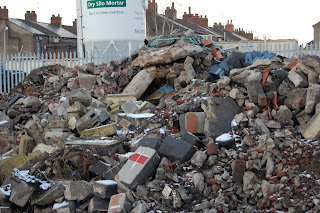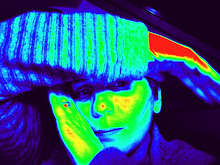The worst thing that happened...
'Daft' Peter aka Bruce George Lee
My memory of daft Peter Dinsdale, for what it is worth, is of skinny boy in a stripy hat and an anorak. He had a thin arm not quite fully formed, and was, therefore, a bit lopsided when you looked at him from the back. I didn't know him, but I'd seen him. Everyone had seen him and his rickety old bike. He was one of a number of local oddballs - the old fella who picked up tab ends, Wiggy, the old lady who stank of cat piss, the enormously fat boy (who killed himself by over-eating, and who I now realise must have had prader-willi syndrome), Eamon who waved to me (and everyone) from the Cider Bar - that an old bus shelter at the Hessle Road end of the Boulevard. It was rich in detail where I grew up, even Horace next door with his florescent socks and his large model of a submarine in his middle room, was averagely strange and all, all were the antithesis of the quiet cul-de-sacs and semi-detached lives of the people I was in top set German with.
Peter Dinsdale, who had his name changed by deed poll to Bruce Lee was a delusional, sad case. In 1979, he became, for a time, the most prolific serial killer in England. His notoriety did not last, detained as he was under the mental health act (presumably til he dies) ensuring that he disappeared from the public domain almost as quickly as he appeared. But if you are from Hull, and west Hull in particular the memory of what daft Peter did (or was supposed to do) lives vivid in the memory.
Daft Peter, by his own confession on the 4th December, 1979, poured paraffin through the door of a notorious family's house and the subsequent fire killed three of the boys who slept there. The marriage of these two things - the arson attack and the fact it was this family, reverberated around the neighbourhood like a slow rhythmic drum beat. The shock was palpable.
I knew this family. I knew them from a distance as most people did, and I also knew them up close and personal as they threatened to beat the living shit out of me. I knew them, as everyone did by reputation, and by experience. There is a certain irony I cannot help feeling about modern politicians and their pronouncements about feral children and broken societies... as though these things are new, when the truth is there has always been an element who were best avoided, who always existed outside the system - occasionally falling foul of it, always an element who ran wild... The Hastie family were that family. I want, and am passionate advocate for equality of opportunity and for those on the margins to be offered the same chances as those in power but I am also a realist and some people will never want this for themselves.
Edith Hastie and her husband Charles senior were notorious rabble rousers. At 34, Edith was the mother of 7 children, four boys and three girls and she was not, to put it bluntly, to be fucked with.
My clearest memory of her was on a bright autumnal, sunny day. I was charged, by the vicar, along with my sister (I think) and some other girls with clearing the back of the church hall of rubbish. We worked at our task quite methodically, throwing old bits of wood and other things onto a fire. The centre piece of the waste ground was an old wooden door propped against some bricks, and, sure this was heavy and would require a group effort we seemed to skirt around it.
As the afternoon wore on, and the sun got higher and the cold came in, I felt, and then noticed, that we were being watched. First one Hastie boy was there, and then another, and finally a third, each similar looking and slightly bigger than the last, a sort of star-jumpered version of russian dolls.
I don't remember the precise configuration of Charlie junior's expletives but it was very clear that he was unhappy. We continued, safe in the knowledge that the vicar would protect us and that we would surely go to heaven for our efforts, and continued to move wood and other broken items to the fire.
Finally the centrepiece door was the only thing that remained of our effort. We gathered round it and lifted it up.
"You'd better fucking leave that alone," Charlie said, or words to that effect
The truth is, I was happy to do that, I was happy to leave it. I was not brave then and I am not brave now. I did not want to fight with Charlie and his unwieldy family - particularly Angelina who I had encountered before, and who I knew packed a punch. I did not want to fight with any of them. I had been on the wrong end of Charlie's wrath too - when me and a scout I knew found his cache of porno mags behind the church. I didn't want trouble.
I looked down behind the door and saw that beneath lay cigarettes, and alcohol and a range of other contraband that I assumed had not been gathered by legal means. This would, ordinarily have been a good hiding place if an interfering vicar and a bunch of guides hadn't bumbled their way to a discovery.
The vicar, who up until that point, had always seemed to me to be a total wimp, suddenly was overcome with something akin to bravery. "Obviously," he began, "If they're on church property - they belong..." He didn't quite finish his sentence, because by this time Charlie was spitting feathers, threatening Armageddon and a bit more besides.
Charlie left the scene, and returned with what looked like a weapon and the vocal support of his mum and dad, now hanging, semi naked from the front bedroom window of their house. Edith had a sheet wrapped around her and Charles senior was just plain butt naked. Believe me, this kind of afternoon romp may have been popular in the 70s but you did not throw open your windows and advertise it. Charles senior had just been released from prison, and this was offered as an explanation of their behaviour, but I think we were all a little taken aback...
The vicar, bizarrely - stood his ground. I was hiding my face. Because I knew being seen was a bad move, and I knew that we were not going to survive any systematic campaign devised by the family and that our lives would be hell. Charlie threatened us. Peter threatened us. Paul did. Charles senior and Edith threatened us. I have no doubt that we would have got our comeuppance. We had suffered at the hands of Angelina, and Charlie had joined in for fun, Friday after Friday on our way to the guides. But the threatened revenge did not happen.
Charlie Hastie
It did not happen because Daft Peter, allegedly, took matters into his own hands. It had absolutely nothing to do with us, or what had happened on that autumnal afternoon. History tells a story of difficulties between Daft Peter Dinsdale and Charlie Hastie, but I do not believe the stories of things that happened between them in public lavatories. Charlie was a bad lad, but I find it hard to credit that he prostituted himself to Peter Dinsdale or anyone else. Or indeed that Peter Dinsdale was capable of the monstrous revenge he wrought. I may be wrong, I have been wrong before, but I just don't buy it...
Whatever the truth of any tale, the Hastie boys lay asleep in their house on Selby Street, when someone, Bruce Lee, or someone else, put lighted paraffin through their door. Edith Hastie told how Charlie threw her from the window tosave her, and returned to the bedroom of his younger brothers to save them too. They all perished.
The neighbourhood was alive with gossip and rumour. It is true to say that many people had fallen out with the Hastie family, and our little episode was a minor one compared to some of the tales of woe and campaigns of terror that came out from their immediate neighbours. But my teenage self was outraged that this could have happened, even to boys who had caused me pain, even to a family who had frightened me and who I had crossed the road to avoid.
I remembered my guide leader saying that they deserved it, because they were bad through and through and I remember thinking that if she represented God, and God supported what she thought, then that would be my last moment of believing. This sense of outrage and grief confused me, but I knew that whatever they had done, they did not deserve this terrible end - a feeling reinforced by the act of pushing their smiling faces through door after door on my paper round. Nobody deserved the revenge meted out to them.
Later, a conspiracy theory grew up around the fire - tales of drugs, drugs sellers and the wrong house being targeted, but Daft Peter Dinsdale aka Bruce George Lee remains inside for this and other crimes.
















